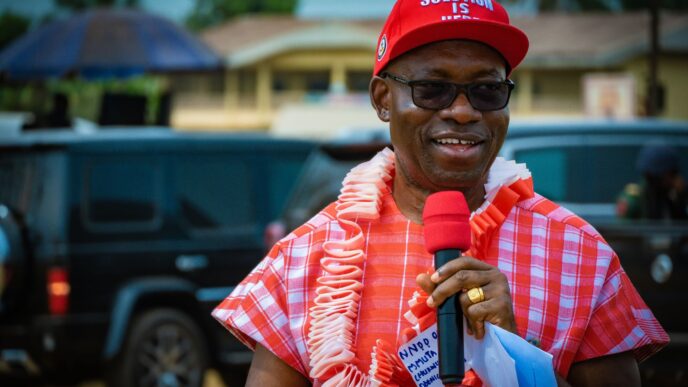Kemi Badenoch is the first black woman to become the leader of a major UK party
Ordinarily, the recent election of Kemi Badenoch as the head of Britain’s Conservative Party and also the opposition in the parliament should bring joy, reassurance and pride to Nigerians who keep craving for signs of redemption on various fronts. The first official indication that what was supposed to be euphoric would turn anti-climatic appeared in the form of a post from the Special Adviser to President Bola Tinubu on diaspora matters, Mrs Abike Dabiri-Erewa, in which she revealed her frustrations with reaching Badenoch to convey the nation’s gladness and excitement about her unprecedented feat.
It was no surprise, however, to those who were already used to her unflattering, ridiculous public comments on Nigeria at every given opportunity. “I grew up in Nigeria and I saw first-hand what happens when politicians are in it for themselves, when they use public money as their private piggy banks, when they promise the earth and pollute not just the air but the whole political atmosphere with their failure to serve others. I saw what socialism is for millions. It’s poverty and broken dreams. I came to Britain to make my way in a country where hard work and honest endeavour can take you anywhere,” Badenoch declared two years ago in her earlier effort to lead the Tories.
Truth be told, the veracity of that statement can hardly be faulted by many Nigerian citizens and watchers of the nation’s chequered history. Down the years, most of our political leaders, not exonerating their colleagues in other spheres, find it increasingly difficult to convince the people that they’re in public offices for the common good. The despicable position the country has found itself is traceable primarily to the cluelessness, deviousness and incompetence of the persons entrusted with the task of nation-building.
But Kemi’s unprovoked, unfair, debatable comparison of the United Kingdom with Nigeria is unfortunate on many grounds. She might soon realise that no matter the justifications for her anger against and distaste for the land of her forefathers, she shouldn’t have let them boil over in the global square. And regardless of the gains she hopes to garner that way, common sense should have directed her along the path of caution, propelled by the demands of self-preservation in the treacherous terrain of politics. But no, not this Kemi.
Advertisement
The other day at a migration event in Abuja, Vice President Kashim Shettima gave her a candid advice and reinforced the country’s stature, its obvious degeneracies notwithstanding: “We are proud of her despite her efforts at denigrating her nation of origin. She is entitled to her own opinions; she has even every right to remove Kemi from her name, but that does not underscore the fact that the greatest black nation on earth is the nation called Nigeria. One out of every three or four black men is a Nigerian and, by 2050, Nigeria will surpass the United States and will be the third most populous nation on earth.” Even if one dismisses Shettima’s assessment as superfluous, when weighed against the ugly present realities, that intervention is a worthy recommendation of how Nigerians should react in a world where other citizens simply do not wait for perfection to both own and positively project their own countries.
Again, as if possessed by an overpowering hubris, Badenoch couldn’t let the VP’s comment pass without savaging it. And she went for the jugular this time: “I find it interesting that everyone defines me as a Nigerian. I identify less with the country than with my specific ethnic group. I have nothing in common with the people from the north of the country, the Boko Haram, where Islamism is. Being Yoruba is my true identity and I refuse to be lumped with the northern people of Nigeria who were our ethnic enemies, all in the name of being called a Nigerian.” Actually, it was this new low – laced with manic generalisation, mischief, hate, contempt and ignorance – that made me decide to contribute my humble kobo to the ongoing potentially divisive discourse.
Kemi has since attracted a deluge of venom to herself and it’s not in my character to add to it. Strangely, perhaps, what I have for her is pity. She parades a personality that’s at variance with her humanity. Psychology has robust explanations for her type, for the benefit of those interested in fathoming her motivations. One private fear I nurse for her is that the political patrons she’s trying hard to please are too intelligent not to notice their leader’s flawed capacity for sound judgment devoid of vile sentiments. Of course, she must have been put forward to serve specific self-preserving purposes in these perilous times of her party’s life. May Badenoch not discover too soon that she’s still an outsider insider. Posterity doesn’t always treat kindly those who inflict injuries on their own roots. The example of trees ought to be enough. But in the metaphysical configuration of fate, the obstinate and self-righteous often move inexorably towards a certain unintended, usually ignoble end.
Advertisement
And may that not be so for our lady who’s on a very high horse, a possible future prime minister of a former colonial powerhouse and convener of the Commonwealth. That is if she listens to counsels like that of the Bishop of Catholic Diocese of Sokoto, Matthew Hassan Kukah, contained in an article published last week on several media platforms. Titled, “Kemi Badenoch: Some Thoughts and a Prayer”, the respected clergyman stated that her “speed of progress is phenomenal by any measure. She had no visible name recognition, experience, age or even resources. Like Oscar Wilde, the controversial Irish writer, who was asked by Immigration what he had to declare, Kemi can only declare genius! Against the run of play, she is today the Leader of the Conservative Party of the United Kingdom, and Leader of the Opposition.
“Coming from a background where patriarchy holds supreme, many men are still holding their breath. After over a hundred years of presence, no black person has accomplished anything close to this. The drums ought to roll out…. Kemi’s ascendance is special. It points at the possibilities and challenges that lie ahead for those who dare. It is often the case that some doors are closed but not locked. When that right moment comes, you need boldness, courage, character and self-belief and, of course, the grace of God…. She has shown that her identity does not define her, but she cannot either ignore that she is black and the daughter of immigrants. Not only because it would smack of self-hatred, but it would rob her of the authenticity and largeness of spirit required of all transformative leaders.”
That mixture of panegyric and admonition is a must for Kemi and whoever would find himself or herself at such a height in similar circumstances. Thankfully, there’re still many Nigerians abroad who haven’t lost their minds to the relative prosperity of the lands of their sojourn. Personalities like the British-Nigerian boxing legend, Anthony Joshua, have remained proud of their origin against all odds. It’s actually not too late for Kemi to retrace her steps.
Last note, because communication is one activity that takes place every time, everywhere and in various forms, it tends to be taken for granted. Something as simple as knowing the differences between interpersonal and public communication, or coming to terms with one’s personality in relation to views rendered publicly via media of mass communication, can make a huge difference in outcomes. Realising these in an age of volatile and speedy information dissemination is now more pertinent than ever.
Advertisement
Ekpe, PhD, is a member of THISDAY editorial board.
Views expressed by contributors are strictly personal and not of TheCable.
Add a comment











